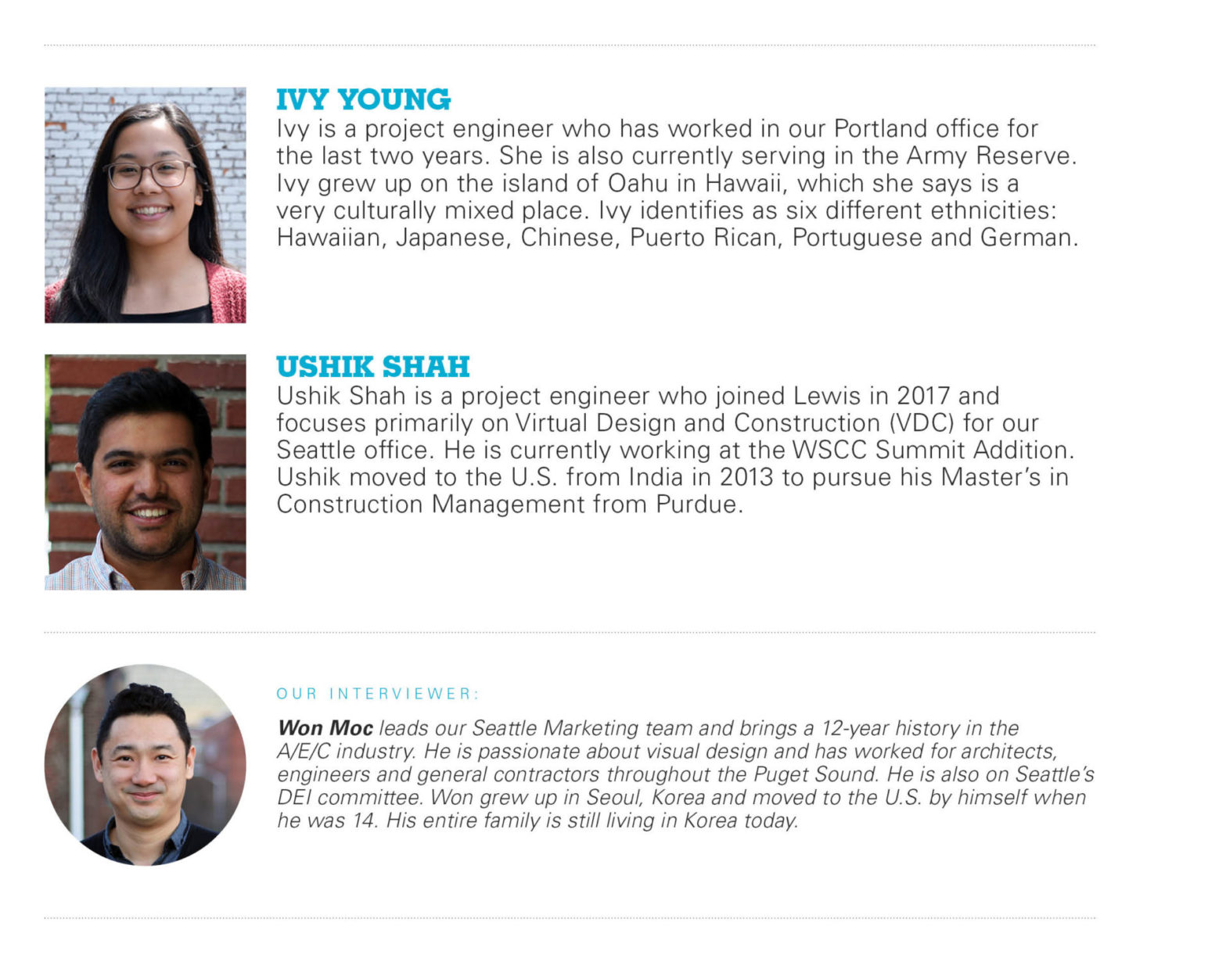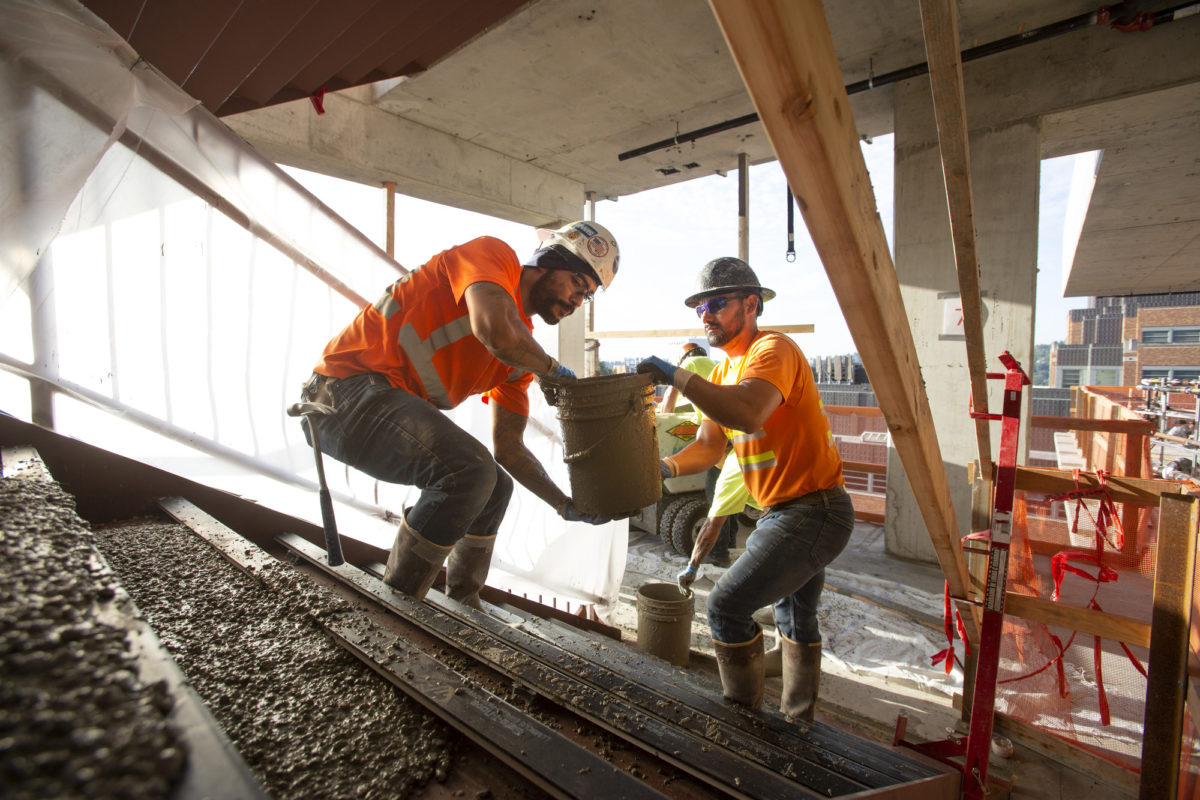This is the second blog in Lewis’ Martin Luther King Junior Day series, which shares the perspectives and experiences of several Lewis employees in celebration of diversity, equity and inclusion. Earlier this week, we heard from Celina Yee and David Torres on their experience in the construction industry and what diversity, equity and inclusion mean to them.
Today, you will hear from Project Engineer Ivy Young and Project Engineer Ushik Shah on their experiences, their hopes for our industry and, for Won and Ushik, why they chose to move to the United States.

WM: What is it like to be a woman and BIPOC working in the construction industry?
IY: I have only worked in the industry for a couple of years, but I don’t feel like there is any difference for me. The people I work with are mentors who help me learn how to be better at my job. We are all here to support each other and make sure we can put out our best work.
US: I’ve had a really good experience with how people have treated me at Lewis. I feel like my project team has people from all different places and is quite diverse. It makes me feel at home. While I have been working at [the WSCC Addition], I don’t feel like I am in an industry that is dominated by white men. I’ve had some isolated negative experiences when I was in grad school in Indiana but that’s the extent of it.
WM: To be frank, I didn’t really recognize a lot of the racial injustices until the BLM protests and marches. I started to reflect on my own experiences, and it made me more aware of how many times a day I am the only Asian person or minority sitting in meetings. I don’t think that’s a bad thing, but its important for me to understand that. In general, I have never had strong experiences like Ushik did in Indiana. People at Lewis really seem to see me for who I am.
IY: Have either of you had other experiences working at different companies?
WM: Yes. Before joining Lewis, I worked for several companies in the A/E/C industry. Some had more gender diversity but less ethnic diversity and some were less diverse but just as accepting and inclusive of people from different backgrounds. I worked for one company that didn’t have a very good understanding of diverse perspectives. It boiled down to unconscious bias, but it was tough for me to work there because I wasn’t understood.
US: I agree with what you say about unconscious bias. I don’t like to use that word because it’s such a buzz word these days, but there is a bias or hesitation when people talk to me about certain things and I wish that hesitation or stigma would go away. I want people to be more willing and open to talk to me without fear of judgement. I really hope that changes in the future.
IY: That reminds me of the Martin Luther King quote about his kids being judged by the content of their character and not by the color of their skin. It’s almost like people are hyper-aware of race and gender and political correctness. People almost make it uncomfortable by thinking they might say something wrong, but I think if we have a willingness and openness to share what people have to say, the sensitivity will not be so prevalent.
US: Won, where do you see DEI going within the construction industry?
WM: I think it has already made a lot of progress, but frankly, construction is behind other industries when it comes to promoting diversity. As an industry, we have a lot of work ahead of us to teach people to be more aware. The more open conversations we can have, the more people can focus on the content of your character, not where you came from or how you identify. This will come slowly, and I think we need to be okay with that. When I think about our DEI journey at Lewis, the day-to-day progress is small incremental change. But when I reflect on my three years here, I have seen huge improvements.
US: I agree. I think if we continue to work towards diversity in construction, like eventually seeing diversity at the leadership level, it will trickle down and attract more diverse employees, which I think can only benefit our company.

WM: We have heard a lot about what Lewis is doing to promote diversity through our DEI Committee this year. What has been your experience with Lewis’ diversity, equity and inclusion journey?
US: I am happy to see the how active the DEI committee is now. To be honest, it wasn’t until last summer that I really started to hear about them. It makes me happy to see that there is a group of people at Lewis that is trying to promote diversity and educate others in the company.
IY: I would say it’s the same for me as well. Before this year, I knew we supported Pride but I wasn’t aware of much else. I think it is good to hear what the committee is doing, and to have these conversations, but I wouldn’t want to see Lewis put something out that is ingenuine. I want these to be honest conversations.
US: I know that diversity and inclusion is not an easy topic to discuss. I hope now that we have started having these conversations as a company, the stigma associated with it goes away and we can all start to have more open and honest conversations.
IY: Since both of you moved to the U.S. from other countries, what was your initial impression of our country and what made you want to stay?
WM: My impression was pretty darn rosy. I grew up in a country that consists of one race and growing up everyone looked like me. I visited the U.S. before I moved here and experiencing a culture so different from my own was very exciting to me. Korea is probably half the size of Washington State, so the idea of a place with so much diversity and opportunity was exciting to me.
US: I always wanted to experience living in another country. America is known to be a melting pot of different cultures and the “land of opportunity” and I wanted to experience that firsthand. I’ve had a blast living here!
My family, like most Indian families, wanted me to be a doctor or get into tech but I was a rebel, I wasn’t going to do that. Growing up I watched a lot of American TV and liked the show Prison Break in high school. One of the main characters was a Structural Engineer and that is what pushed me toward Civil Engineering. I would probably be a lawyer right now if I was watching Suits in high school.
WM: How do you both connect to and celebrate Martin Luther King Day?
IY: In the past I haven’t connected to it that much. The thing that I relate to is the quote about character. When I was hired here, I don’t think I was picked because of the way I look, I was hired because I had the skills that allowed me to do my job. I think Martin Luther King was fighting for me to be able to be hired regardless of my race, and we are at a point where I can be hired not because of my race but because of my qualifications.
US: Until a few years ago, I didn’t think much of MLK Day—other than it was the first long weekend of the year! But I had a friend who decided to spend that day volunteering and I asked him why he would spend his day off doing that. He told me all about Martin Luther King’s work and why people celebrate by volunteering—it was really inspiring to me. My wife and I decided that we should find a way to contribute to our community too.
Thank you, Celina, David, Ivy and Ushik, for sharing your experiences this week. We hope to have more of these conversations as we continue our diversity, equity and inclusion journey. We celebrate Martin Luther King’s work to fight racial injustices more than a half decade ago, but we recognize the work has just begun.

